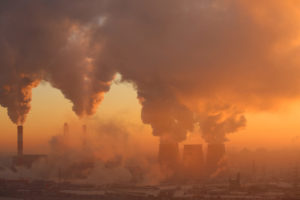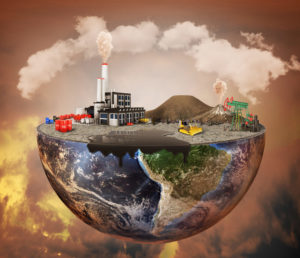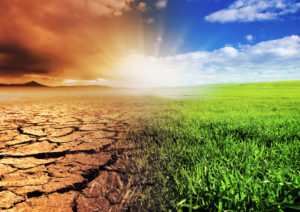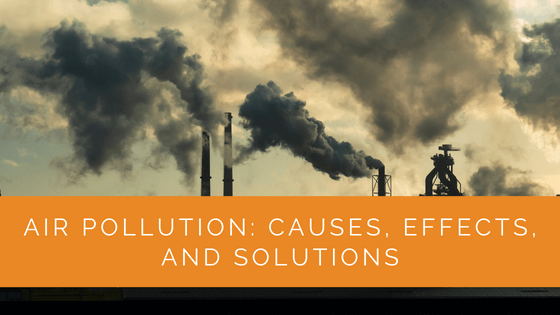Air pollution, an escalating environmental challenge, impacts our health and the planet’s ecosystems. This complex issue arises from various sources, both natural and man-made, and its consequences are far-reaching, affecting everything from individual health to global climate patterns. This article explores the multifaceted causes of air pollution, including industrial activities, agricultural practices, and natural phenomena. We also delve into the profound effects of air pollution on human health, wildlife, and the environment, such as respiratory diseases, global warming, and acid rain. Furthermore, the article proposes practical solutions at individual, industrial, and governmental levels, highlighting the critical role everyone plays in addressing this urgent issue. Understanding the causes, effects, and potential solutions to air pollution is key to making informed decisions and taking action to protect our health and the environment.
Contents
Key Takeaways
- Air pollution is a significant health concern in the US, caused by various factors, including human activities like agricultural practices, industrial emissions, fossil fuel use, and natural sources like forest fires and volcanic eruptions.
- Air pollution has serious health effects, including respiratory and heart disorders, and contributes to global warming and acid rain, harming humans and the Earth’s ecosystem.
- Solutions to address air pollution include using renewable energy sources, promoting public transportation, tree planting, and government regulations to reduce emissions at industrial and organizational levels. Collaboration among individuals, industries, and governments is essential to combat this environmental crisis.
What is Air Pollution?
Air pollution refers to the air’s contamination due to unwanted substances that degrade its quality. These pollutants can be chemical or biological.
The natural sources of air pollution can be forest fires or volcanic eruptions. At the same time, man-made causes consist of industrial, ignitable, and locomotive gases. These gases include sulfur dioxide, carbon dioxide, and nitrogen oxides.
Most man-made emissions are greenhouse gases and carbon dioxide, increasing Earth’s temperature. Eventually, the rising level of air pollution leads to global warming.
Not only gases but toxic physical substances called particulate matter degrade air quality. According to WHO guidelines, most of the population worldwide breathes air that exceeds healthy limits. Consequently, all these harmful gaseous and particulate matter give rise to many serious health issues.
Broadly, there are two kinds of air pollutants:
Primary pollutant
These are contaminants that directly contribute to air pollution. For example – the emission of harmful gases from factories and industries. These pollutants are NOx, SOx, particulate matter, volatile organic compounds, etc.
Secondary pollutant
Secondary pollutants are air contaminants formed due to intermixing of primary pollutants. For example – smog. Handling and controlling secondary pollutants can be challenging. This is because they react in unpredictable ways.

Causes of Air Pollution
As mentioned earlier, a significant segment of air pollution is due to human activities. Some of these are:
Agricultural practices
Many farmers burn the crops after the season is over. They do this to enhance soil quality and empty the field to prepare for the next crop. This leads to the release of harmful gases and particles of ash into the air, leading to pollution.
Moreover, the production and use of nitrogen-based fertilizers release greenhouse gases like ammonia. This degrades the quality of air considerably. Even pesticides and insecticides are sprayed in gaseous forms, increasing the air’s toxicity.
Human lifestyle practices
To survive daily, humans are majorly dependent on fossil fuels in one way or another. We burn energy for our electrical needs while running our households or vehicles. This releases toxic gases into the environment.
Similarly, the building of a house also causes air pollution. The construction particles contaminate the air, while painting releases toxic chemicals into the atmosphere.
Industrial and Mining activities
Industries, power plants, and factories release toxic gases into the air, which are byproducts. Some of these gases are carbon monoxide and hydrocarbons. These emissions disrupt the standard air quality and pollute nearby areas.
Mining activities emit minute particles into the air. These usually get mixed up with fog and remain suspended in the air. Eventually, when people breathe in this air, it reaches the lungs. Therefore, it can lead to overridable lung damage.
Natural Causes
Apart from human activities, there are also some natural causes of air pollution. Besides forest fires and volcanic eruptions, nature has other ways of creating air pollutants. For example – methane produced by cattle as a byproduct of digestion is a greenhouse gas. Moreover, dust from naturally barren lands adds to the family of particulate matter pollution. Another latent form of air pollution is the emission of radon gas from natural radioactive decay.

Effects of Air Pollution
Health
Lower air quality can lead to acute and prolonged health problems in humans.
Most of these health issues are concerned with respiratory or heart disorders. Some diseases, such as asthma, COPD, or emphysema, can be severe.
However, exposure to air pollutants can generally give rise to physical problems on various levels. The health impact of the high level of short-term exposure can cause burning of the eyes, nausea, fatigue, dry throat, or difficulty breathing.
At the same time, long-term exposure can lead to health effects such as bronchitis or lung cancer. Apart from this, the overall functioning and lung capacity also suffer considerably. This increases strain on the heart, resulting in cardiac ailments.
The impact of high pollution levels is significant in specific populations, such as:
- Sick, elderly, or children.
- Construction, mining, and factory workers
- Pregnant women
- Athletes or people living near industrial areas
Global effects
The effects of air pollution are not only limited to human beings and animals but also extend to the Earth’s ecosystem. While air pollution directly affects the Earth through global warming, acid rain destroys our planet.
Global warming
The phenomenon of rising water temperature due to greenhouse gases is known as global warming. A rise in the level of these gases in the atmosphere traps Earth’s heat and prohibits it from escaping into space. Consequently, the temperature of the Earth rises.
These gases are usually nitrous oxide, methane, HCFC, HFC, etc. However, carbon dioxide is the most significant contributor to global warming. Humans produce most energy by burning fossil fuels such as natural gas and coal. This eventually leads to the emission of carbon dioxide into the atmosphere.
Acid Rain
Acid rain is when natural rainfall water mixes with toxic chemicals in the air. These chemicals are usually nitrogen dioxide or sulfur dioxide. Consequently, there’s an imbalance in the rainwater’s pH levels. Thus, the toxic water reaching the Earth degrades the quality of the soil and contaminates the water table. As a result of this, the crop and water quality go down. This eventually affects the health of humans, animals, and nature.

Solving the Air Pollution Crisis
If you are concerned about the state of the air we breathe, there are many things you can do to fix it. You can make major contributions in the long run by making minor changes to your daily habits. In short, renewable energy is our friend, and we need to burn as little fossil fuel as possible.
For individuals, some of these solutions are:
- Use an alternative energy source for heating purposes. For example, use a ground or air source heating pump instead of a gas source counterpart.
- While disposing of waste, choose to compost instead of burning.
- Switch to vehicles that use natural gases as fuel. For example – CNG.
- Constantly repair your vehicles, so the admission of harmful gases is least. You can also consider replacing old equipment with more energy-efficient ones.
- When traveling, prefer modes of public transportation. You can also consider carpooling or riding a bicycle to work.
- Consider planting more trees. They absorb carbon dioxide and help in controlling global warming. Organize social events that involve planting trees and request schools to add tree planting to the curriculum.
At the industrial and organizational levels, some solutions are:
- Industries should treat gases before they are released into the air.
- The government should impose protocols and give incentives to improve air quality.
- NGOs and government campaigns should be launched to educate the population about air pollution. This will propel them towards better practices.
- Regular seminars and summits must be organized to spread awareness about actionable steps that help reduce pollution levels.
Additionally, the government is responsible for creating laws and promoting the use of renewable energy. The US government has collaborated with other parties to promote renewable energy and reduce air pollution. One such initiative is the Clean Air Act.
Expert Insights From Our Solar Panel Installers About Air Pollution: Causes, Effects, and Solutions
Air pollution significantly impacts our health and the planet’s ecosystems. Understanding its causes, such as industrial emissions and fossil fuel use, is crucial for developing effective solutions to mitigate its effects on global warming and human health.
Environmental Scientist
Practical solutions to air pollution include adopting renewable energy sources, promoting public transportation, and implementing strict government regulations to reduce emissions. Collective action from individuals, industries, and governments is essential to combat this environmental crisis.
Solar Energy Consultant
Planting trees and switching to energy-efficient appliances are simple yet effective ways individuals can contribute to reducing air pollution. Every small action counts towards creating a healthier environment for future generations.
Sustainable Energy Advocate
Bottom Line
The Earth is choking, trying to fulfill all our needs. The frenzy of consumption has subdued our capability to think. It might be too late to turn things around and make everything perfect. But this doesn’t mean we just sit and watch the Earth die. The best we can do is try and make it better.
You can take many big and small steps to improve air quality. If not for yourself, think about your grandchildren. Due to the increased air toxicity, the average age of human beings is decreasing, not to forget the diseases we have to deal with that eventually degrade the quality of life.
Therefore, it is time for everyone to switch to better practices. This holds whether you are an ordinary human, entrepreneur, or industrialist. We all have to work together to help save the Earth’s natural resources!
About the Author
Solar Panels Network USA stands at the forefront of solar energy solutions, driven by a team of seasoned solar engineers and energy consultants. With over decades of experience in delivering high-quality solar installations and maintenance, we are committed to promoting sustainable energy through customer-centric, tailored solutions. Our articles reflect this commitment, crafted collaboratively by experts to provide accurate, up-to-date insights into solar technology, ensuring our readers are well-informed and empowered in their solar energy decisions.

